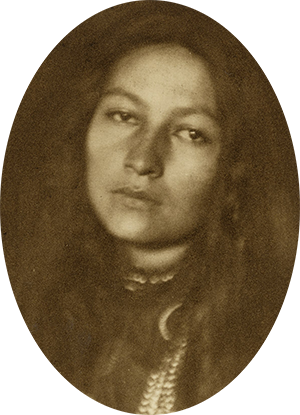Gertrude “Zitkala-Ša” Simmons Bonnin (1876-1938)
Page Content

 Zitkala Ša "Red Bird," ca. 1900. (Courtesy of National Portrait Gallery, Smithsonian Institution)
Zitkala Ša "Red Bird," ca. 1900. (Courtesy of National Portrait Gallery, Smithsonian Institution)
“In the land that was once his own… there was never a time more opportune than now for America to enfranchise the Red man!”
A member of the Yankton Dakota Sioux, Zitkala-Ša (“Red Bird”) left the reservation as a child to attend a Quaker boarding school. Though she enjoyed learning to read, write, and play European music, Zitkala-Ša mourned for the culture which she felt stripped from her by forced assimilation. She spent her adolescence moving between these two worlds, gaining insight into both while developing her skills as a writer and performer.
By 1900 she became deeply critical of the American Indian boarding school system, and published articles condemning it in Atlantic Monthly and Harper’s Monthly. In 1913, she co-authored The Sun Dance Opera, the first opera written by and about Native Americans, based on the outlawed Sioux ritual. In 1916, she became secretary of the Society of American Indians, which aimed to preserve traditional cultures while also lobbying for U.S. citizenship of Native Americans. Zitkala-Ša also wrote several books and articles detailing the Native American experience for the education of both indigenous and white audiences.
In 1926, Zitkala-Ša founded the National Council of American Indians. This council worked to unite U.S. tribes behind the cause of full citizenship and voting rights. She would serve as its president until her death in 1938, fighting for civil rights, access to healthcare, and education for all Native Americans.
Next: Louise Bryant >